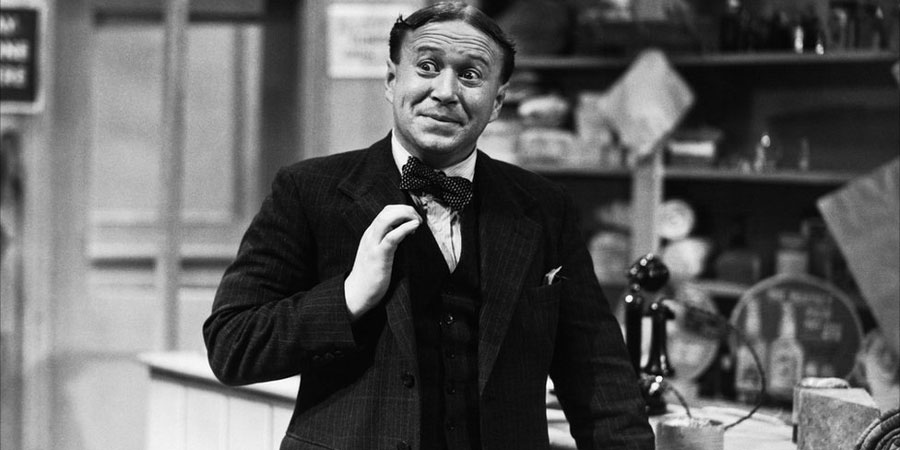Pinwright's Progress (lost first half-hour television sitcom; 1946-1967): Difference between revisions
Happy Brian (talk | contribs) (Minor changes.) |
|||
| (One intermediate revision by one other user not shown) | |||
| Line 2: | Line 2: | ||
|title=<center>Pinwright's Progress</center> | |title=<center>Pinwright's Progress</center> | ||
|image= Pinwright's Progress.jpg | |image= Pinwright's Progress.jpg | ||
|imagecaption= James Hayter as Mr. Pinwright | |imagecaption= James Hayter as Mr. Pinwright. | ||
|status=<span style="color:red | |status=<span style="color:red;">'''Lost'''</span> | ||
}} | }} | ||
'''Pinwright's Progress''' was the world's first half-hour television sitcom. It was a British series which aired on BBC Television Service from 1946-47. | '''''Pinwright's Progress''''' was the world's first half-hour television sitcom. It was a British series which aired on BBC Television Service from 1946-47. | ||
Episodes of ''Pinwright's Progress'' are lost, believed to have been wiped off their tape recordings. 10 episodes were produced, airing fortnightly (every 2 weeks) next to ''Keleidoscope'', another half-hour sitcom which aired until 1953.<ref>https://www.comedy.co.uk/tv/pinwrights_progress/</ref> | Episodes of ''Pinwright's Progress'' are lost, believed to have been wiped off their tape recordings. 10 episodes were produced, airing fortnightly (every 2 weeks) next to ''Keleidoscope'', another half-hour sitcom which aired until 1953.<ref>https://www.comedy.co.uk/tv/pinwrights_progress/</ref> | ||
The series was written by Rodney Hobson, edited by Ted Kavanagh, and is about a man, Mr. J. Pinwright, who is competitive about his small shop "'''MacGilligally's Stores'''" which he owns.<ref>Vahimagi, Tise. ''British Television: An Illustrated Guide''. Oxford University Press / British Film Institute, 1994. <nowiki>ISBN 0-19-818336-4</nowiki>.</ref><ref> | The series was written by Rodney Hobson, edited by Ted Kavanagh, and is about a man, Mr. J. Pinwright, who is competitive about his small shop "'''MacGilligally's Stores'''" which he owns.<ref>Vahimagi, Tise. ''British Television: An Illustrated Guide''. Oxford University Press / British Film Institute, 1994. <nowiki>ISBN 0-19-818336-4</nowiki>.</ref><ref>Mark Lewisohn, "Radio Times Guide to TV Comedy", BBC Worldwide Ltd, 2003</ref> His staff add to his problems by trying to help, and one of the messenger boys is a deaf octegenarian, Ralph. Mr. Pinwright has a daughter. | ||
Currently, no episodes of the show survive to this day. | |||
==Episodes== | ==Episodes== | ||
| Line 32: | Line 34: | ||
==References== | ==References== | ||
{{reflist}} | |||
[[Category:Lost TV]] | [[Category:Lost TV]] | ||
[[Category:Completely lost media]] | [[Category:Completely lost media]] | ||
[[Category:Historic]] | |||
Latest revision as of 17:08, 28 July 2024
Pinwright's Progress was the world's first half-hour television sitcom. It was a British series which aired on BBC Television Service from 1946-47. Episodes of Pinwright's Progress are lost, believed to have been wiped off their tape recordings. 10 episodes were produced, airing fortnightly (every 2 weeks) next to Keleidoscope, another half-hour sitcom which aired until 1953.[1]
The series was written by Rodney Hobson, edited by Ted Kavanagh, and is about a man, Mr. J. Pinwright, who is competitive about his small shop "MacGilligally's Stores" which he owns.[2][3] His staff add to his problems by trying to help, and one of the messenger boys is a deaf octegenarian, Ralph. Mr. Pinwright has a daughter.
Currently, no episodes of the show survive to this day.
Episodes
- Episode 1 -- Pilot episode; 29 November 1946
- Episode 2 -- Mr. Pinwright setsu p a Christmas bazaar, which is troubled by the occasional appearance of three robed Father Christmases- one of them a fugitive. Mrs. Sigsbee is the Fairy Queen, so does all end well?; 13 December 1946
- Episode 3 -- Mr. Pinwright tries to lure shoppers by awarding the 50th customer. Cigars or nylons, only paying cash. He pans to open a snack bar, but a salesman gives him some pills which makes it confusing; 27 December 1946
- Episode 4 -- Cash Crisis; 10 Jan. 1947
- Episode 5 -- Fashions and Pashuns; 27 Jan. 1947
- Episode 6 -- Strained Relations; 7 Feb. 1947
- Episode 7 -- The Gypsy's Warning; 21 Feb. 1947
- Episode 8 -- Gone to Seed; 21 March 1947
- Episode 9 -- Radio Activity; 2 May 1947
- Episode 10 -- Staggered Holidays; 16 May 1947
Cast
- James Hayter - Mr. J. Pinwright[4]
- Clarence Wright - Aubrey
- Sara Gregory - Sally Doolittle
- Daphne Maddox - Miss Peabody
- Doris Palmer - Miss Sigsbee
- Leonard Sharp - Ralph
- Charles Irwin - Salesman
- Sam Hinton - Various
References
- ↑ https://www.comedy.co.uk/tv/pinwrights_progress/
- ↑ Vahimagi, Tise. British Television: An Illustrated Guide. Oxford University Press / British Film Institute, 1994. ISBN 0-19-818336-4.
- ↑ Mark Lewisohn, "Radio Times Guide to TV Comedy", BBC Worldwide Ltd, 2003
- ↑ https://www.comedy.co.uk/tv/pinwrights_progress/cast_crew/
